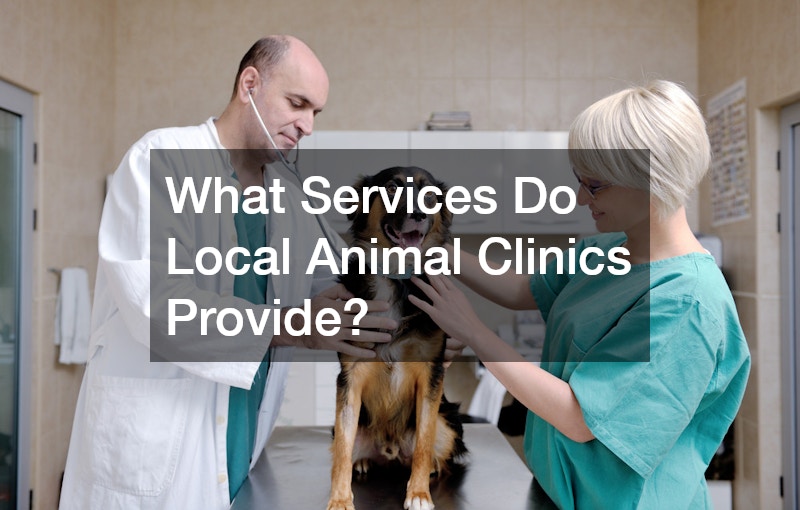
The role of local animal clinics is indispensable in ensuring the health and well-being of our pets. They serve as community hubs where pet owners can seek professional veterinary care, advice, and a wide range of other services. This article delves into the various services provided by local animal clinics, helping pet owners understand the comprehensive care available for their cherished animals.
Video Source
Preventive care is a cornerstone of pet health management, and local animal clinics play a critical role in this area. Regular check-ups can help detect issues before they become serious problems. During these appointments, veterinarians will typically perform physical examinations, evaluate your pet’s health history, and give vaccinations as needed. Keeping vaccinations up-to-date is crucial, as they protect pets from dangerous diseases and help control outbreaks in the community. Routine blood tests and fecal exams are also part of standard preventive care, safeguarding not only the pet but also the pet’s human family from transmissible diseases.
In addition to standard check-ups, animal clinics also offer tailored advice on diet and nutrition, ensuring that pets receive the best possible dietary support. Senior pets often have specific nutritional needs, and clinics can guide how to adjust their diet accordingly. Clinics are also well-equipped to advise on weight management strategies, which are vital for preventing obesity-related health issues. Furthermore, veterinarians can offer insight into proper exercise routines that suit the pet’s specific breed and age. For animals with specific conditions, a local animal clinic may recommend specialized preventive treatments.
Regular dental check-ups are another significant part of preventive care. Dental health is critical to a pet's overall well-being, and local clinics offer cleanings and examinations that can prevent serious problems like periodontal disease. Bad breath, a common issue, can often be an early indicator of deeper health concerns. An animal clinic’s dental services often include plaque removal, polishing, and extractions if necessary. Clinic staff will always guide at-home dental care, such as recommending the best products to use.
Local animal clinics also serve as crucial facilities for emergency and critical care. In cases of sudden illness or injury, time is often of the essence, and clinics are equipped to provide immediate attention. Emergency services commonly include trauma treatment for injuries such as fractures, bites, or lacerations. Clinics can administer life-saving medications, start IV fluids, or perform emergency surgeries when required. An animal clinic’s proximity to the community ensures quick access, which is vital when every second counts.
An essential component of emergency care is the presence of experienced veterinary staff capable of handling high-pressure situations. Their training allows them to assess and stabilize pets swiftly and efficiently, prioritizing the most critical issues. This expertise ensures that diagnostics and treatments are accurate and timely. Fast and correct diagnosis reduces the risk of complications and promotes quicker recovery times. This comprehensive approach extends to providing emotional support to pet owners during stressful situations.
Besides immediate attention, animal clinics also offer continued critical care for pets that need ongoing observation and medical support. This aspect of care may include the monitoring of vital signs, administering medication, and providing specialized nutrition and accommodations. Comprehensive follow-up is often required to ensure the pet’s complete recovery. Through their emergency and critical care services, local animal clinics provide a comforting assurance that help is always available. These measures collectively enhance a clinic’s ability to save lives and improve outcomes for critically ill or injured animals.
In addition to broad health services, many local animal clinics offer specialized treatments and surgical procedures. Advanced diagnostic tools such as ultrasound, X-rays, and laboratory tests enable clinics to identify complex conditions that require specific interventions. Conditions that previously might have required a trip to a larger city can often now be managed locally. This modernization allows pet owners to receive high-quality care without the stress and inconvenience of long-distance travel. Furthermore, having these services locally can also lead to a more personalized approach, as continuity of care is maintained.
Common surgeries performed at animal clinics range from spaying and neutering to orthopedic procedures. Neutering services are vital for population control and can help mitigate behavioral problems in pets. Specialized soft-tissue surgeries address more complex medical needs, such as tumor removals, foreign body extractions, or reconstructive procedures. The availability of these surgical services demonstrates the clinic’s commitment to comprehensive care, providing reassurance to pet owners. Pre-operative and post-operative care, including pain management, is diligently handled to ensure a speedy recovery.
For more specialized cases, veterinary specialists may be available by appointment at the local clinic or through partnerships with outside experts. Dermatology, cardiology, and oncology are some of the fields where specialized knowledge can significantly impact pet health. These professionals collaborate with clinic staff to deliver tailored treatment plans. Such collaboration expands the treatment options available to pet owners, ensuring that even complex conditions can be managed effectively. By offering a blend of general and specialized services, local animal clinics continue to elevate the standard of care for pets.
